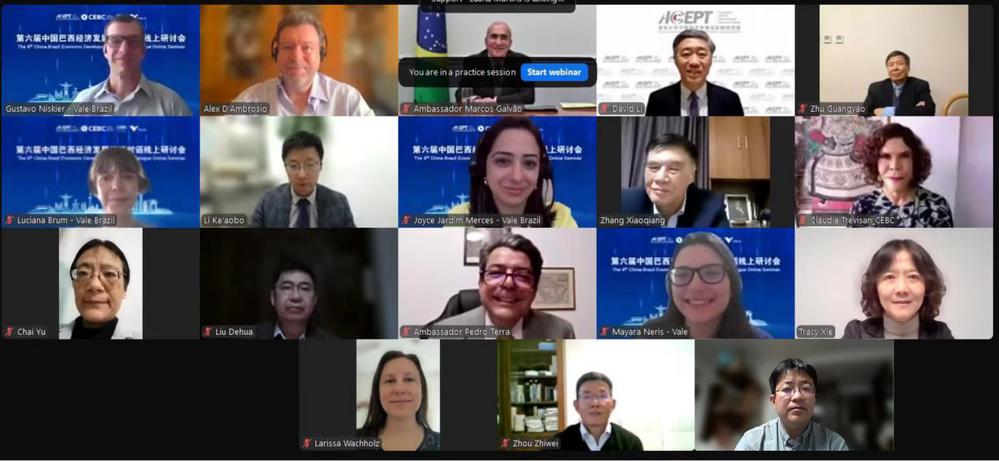6th China-Brazil Economic Development Strategic Dialogue Online Seminar successfully held
On December 16, 2024, the 6th China-Brazil Economic Development Strategic Dialogue Online Seminar, co-organized by Tsinghua University’s Academic Center for Chinese Economic Practice and Thinking (ACCEPT) and Vale S.A. (Vale), was successfully held online.
Alexandre D’Ambrosio, Executive Vice President of Corporate and External Affairs at Vale; David Daokui Li, Director of Tsinghua ACCEPT and Co-President of the Society for the Analysis of Government and Economics (SAGE), and Li Ke’aobo, Executive Deputy Director of Tsinghua ACCEPT, delivered opening remarks, respectively. Zhu Guangyao, former Vice Minister of China's Ministry of Finance; Zhang Xiaoqiang, former Vice Chairman of China’s National Development and Reform Commission and Executive Vice Chairman of the China Center for International Economic Exchanges; Marcos Galvão, Brazilian Ambassador to China; and Pedro Murilo Ortega Terra, Director of the Department for China, Russia and Central Asia at Brazil’s Ministry of Foreign Affairs; along with other esteemed guests, delivered keynote speeches.
Panelists and moderators participating in the seminar’s proceedings included Marcos Caramuru, former Brazilian Ambassador to China; Claudia Trevisan, Executive Director of the Brazil-China Business Council (CEBC); Larissa Wachholz, Partner of Vallya Participações; Ludmila Nascimento, Director of Energy and Decarbonization at Vale; Luciana Brum, General Manager of External Affairs at Vale; Chai Yu, Director of the Institute of Latin American Studies (ILAS) under the Chinese Academy of Social Sciences (CASS); Zhou Zhiwei, Executive Director of the Center for Brazilian Studies at ILAS; and Tsinghua University Professors Liu Dehua and Shi Yixiang. Tracy Xie, President of Vale China, also delivered closing remarks to wrap up the discussions. Participants in the seminar exchanged views on a new set of goals for deepening China-Brazil cooperation over the next 50 years, including jointly promoting the green energy transition and economic development, among other topics of interest.
This year marks the 50th anniversary of the establishment of formal diplomatic relations between China and Brazil, as the relationship between the two countries continues to grow in importance and comprehensiveness within the backdrop of ongoing changes to the global political and economic landscape. As China's largest trading partner in Latin America, Brazil exports a large amount of soybeans, iron ore as well as other agricultural products and mineral resources to China, while China is an important investor in Brazil's infrastructure and energy sectors, with this complementary economic relationship having since laid a solid foundation for sustained bilateral cooperation. The two countries have also engaged in close cooperation through multilateral mechanisms such as the BRICS+ and the Group of 20 (G20) aimed at jointly promoting reforms to global governance and safeguarding the rights and interests of developing countries on the international stage. However, relations between China and Brazil also face many challenges, not only from internal pressures associated with economic uncertainty and volatility as well as concerns with strengthening environmental protections, but also external impacts from rising geopolitical tensions. Especially in the context of the inauguration of United States President-elect Donald Trump, the potential for the new administration to implement unilateral policies while ratcheting up the country's strategic competition with China and involvement within the Latin American region could place additional strains on maintaining the stability of China-Brazil relations. At the same time, there is still significant room for expanded cooperation between the two countries, especially in the fields of green energy, sustainable development as well as scientific and technological innovation, with China's technological capabilities and Brazil’s advantages in natural resources being highly complementary. By addressing common challenges and deepening cooperation and coordination through international channels for economic and multilateral engagement, China and Brazil will not only enhance the resilience of their bilateral relations, but also establish a new paradigm for advancing South-South cooperation, in addition to making a contribution towards fostering a system of global governance that is both fairer and more sustainable.





